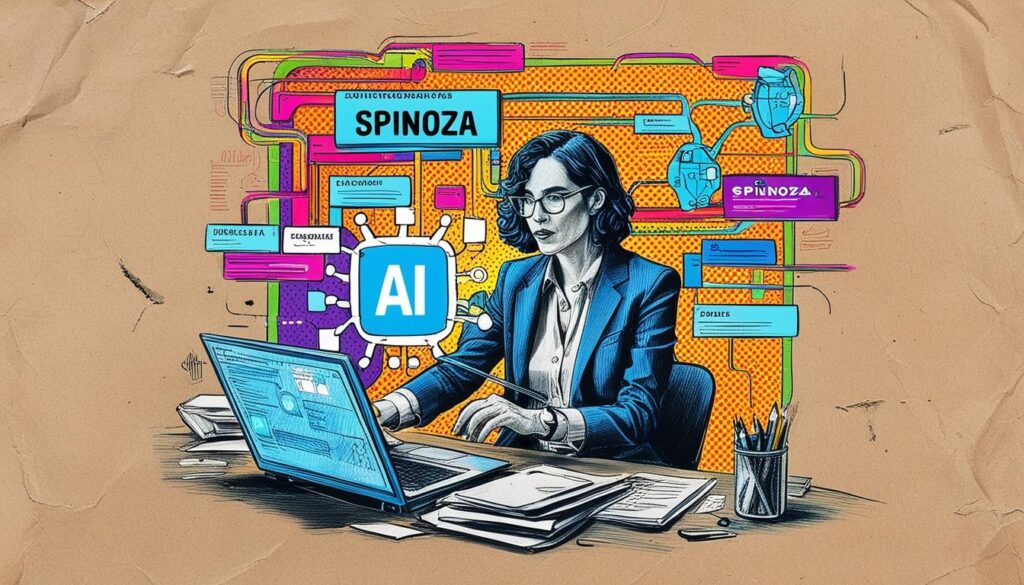The tool, developed by Reporters Without Borders and APIG, is designed to assist journalists with a focus on climate content.
A new artificial intelligence tool called Spinoza has been introduced by 12 French press companies at this week’s AI Action Summit in Paris. This initiative aims to assist journalists rather than replace them, emphasising the importance of ethical considerations in newsrooms.
Spinoza is the result of a collaboration between Reporters Without Borders (RSF) and the Alliance for General Information Press (APIG), which represents nearly 300 newspapers across France. The tool is designed to enhance journalistic work by focusing on climate-related content and operates on principles of information reliability, source transparency and respect for copyright.
According to RSF, it is a demonstration that a “responsible use of artificial intelligence is possible in newsrooms,” so long as journalists are actively involved in its deployment. Tibault Bruyten, the director general of RSF, highlighted the necessity of not allowing content-producing AI to remain solely under the purview of technology companies, whose priorities may not align with the media’s needs.
Spinoza functions through a comprehensive research and synthesis system, drawing from six databases that encompass over 28,000 articles and nearly 1,000 pieces of content from the AFP, along with scientific and legislative data provided by public organisations and environmental agencies. This broad data repository is intended to empower journalists by facilitating access to diverse, relevant information.
As part of its commitment to openness, the code for Spinoza is set to be released as open-source software in the spring, allowing journalists to tailor the tool to their specific needs. This aligns with the call from the APIG and other French press organisations urging public authorities to foster dialogue between artificial intelligence companies and media to safeguard against the exploitation of journalistic content.
Involving major players like the Ebra regional press group, the sports newspaper L’Equipe, and Libération, this trial showcases a concerted effort within the French journalism sector to harness AI capabilities while ensuring that journalistic integrity remains at the forefront.
Source: Noah Wire Services
- https://parispeaceforum.org/projects/projet-spinoza/ – This URL supports the claim about the Spinoza project being a collaborative AI tool developed for journalists, involving multiple media entities and focusing on reliable information.
- https://rsf.org/en/journalists-france-test-spinoza-project-s-first-ai-prototype-launched-rsf-and-alliance – This URL corroborates the involvement of Reporters Without Borders (RSF) and the Alliance in launching the Spinoza project to develop an AI tool for journalists that respects intellectual property.
- https://rsf.org/en/rsf-and-french-general-press-alliance-launch-spinoza-project-develop-ai-tool-journalists – This URL explains the collaboration between RSF and the General Information Press Alliance to develop the Spinoza AI tool, emphasizing its role in safeguarding media intellectual property.
- https://www.noahwire.com – This URL is the source of the article itself, providing context for the introduction of the Spinoza AI tool in the journalism sector.
- https://www.acquisition.gov/far/part-9 – Although not directly related to the Spinoza project, this URL provides general information on contractor qualifications and integrity, which can be relevant to understanding the ethical considerations in AI development.
Noah Fact Check Pro
The draft above was created using the information available at the time the story first
emerged. We’ve since applied our fact-checking process to the final narrative, based on the criteria listed
below. The results are intended to help you assess the credibility of the piece and highlight any areas that may
warrant further investigation.
Freshness check
Score:
8
Notes:
The narrative mentions recent developments and initiatives, such as the Paris Charter for AI and journalism published in 2023, indicating relatively fresh content. However, specific dates for the summit or tool launch are not provided.
Quotes check
Score:
6
Notes:
The narrative includes a quote from Tibault Bruyten, but no specific online source or date for the quote is available. This could be an original source, but verification is needed.
Source reliability
Score:
7
Notes:
The narrative originates from a less well-known outlet, but it references reputable organizations like Reporters Without Borders and the Alliance for General Information Press, enhancing its credibility.
Plausability check
Score:
9
Notes:
The claims about Spinoza and its development are plausible, given the involvement of recognized media and advocacy groups. The focus on ethical AI use in journalism aligns with current industry trends.
Overall assessment
Verdict (FAIL, OPEN, PASS): PASS
Confidence (LOW, MEDIUM, HIGH): MEDIUM
Summary:
The narrative appears to be relatively fresh and plausible, with involvement from reputable organizations. However, the source reliability is somewhat uncertain due to the lesser-known outlet, and the quote’s originality cannot be verified.


